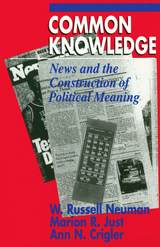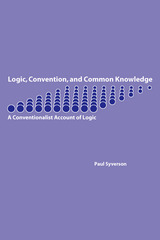3 books about Common Knowledge

Common Knowledge
News and the Construction of Political Meaning
W. Russell Neuman, Marion R. Just, and Ann N. Crigler
University of Chicago Press, 1992
Photo opportunities, ten-second sound bites, talking heads and celebrity anchors: so the world is explained daily to millions of Americans. The result, according to the experts, is an ignorant public, helpless targets of a one-way flow of carefully filtered and orchestrated communication. Common Knowledge shatters this pervasive myth. Reporting on a ground-breaking study, the authors reveal that our shared knowledge and evolving political beliefs are determined largely by how we actively reinterpret the images, fragments, and signals we find in the mass media.
For their study, the authors analyzed coverage of 150 television and newspaper stories on five prominent issues—drugs, AIDS, South African apartheid, the Strategic Defense Initiative, and the stock market crash of October 1987. They tested audience responses of more than 1,600 people, and conducted in-depth interviews with a select sample. What emerges is a surprisingly complex picture of people actively and critically interpreting the news, making sense of even the most abstract issues in terms of their own lives, and finding political meaning in a sophisticated interplay of message, medium, and firsthand experience.
At every turn, Common Knowledge refutes conventional wisdom. It shows that television is far more effective at raising the saliency of issues and promoting learning than is generally assumed; it also undermines the assumed causal connection between newspaper reading and higher levels of political knowledge. Finally, this book gives a deeply responsible and thoroughly fascinating account of how the news is conveyed to us, and how we in turn convey it to others, making meaning of at once so much and so little. For anyone who makes the news—or tries to make anything of it—Common Knowledge promises uncommon wisdom.
For their study, the authors analyzed coverage of 150 television and newspaper stories on five prominent issues—drugs, AIDS, South African apartheid, the Strategic Defense Initiative, and the stock market crash of October 1987. They tested audience responses of more than 1,600 people, and conducted in-depth interviews with a select sample. What emerges is a surprisingly complex picture of people actively and critically interpreting the news, making sense of even the most abstract issues in terms of their own lives, and finding political meaning in a sophisticated interplay of message, medium, and firsthand experience.
At every turn, Common Knowledge refutes conventional wisdom. It shows that television is far more effective at raising the saliency of issues and promoting learning than is generally assumed; it also undermines the assumed causal connection between newspaper reading and higher levels of political knowledge. Finally, this book gives a deeply responsible and thoroughly fascinating account of how the news is conveyed to us, and how we in turn convey it to others, making meaning of at once so much and so little. For anyone who makes the news—or tries to make anything of it—Common Knowledge promises uncommon wisdom.
[more]

Logic, Convention, and Common Knowledge
A Conventionalist Account of Logic
Paul F. Syverson
CSLI, 2002
One of the fundamental theses of this book is that logical consequence and logical truth are not simply given, but arise as conventions among the users of logic. Thus Syverson explains convention within a game-theoretic framework, as a kind of equilibrium between the strategies of players in a game where they share common knowledge of events—a revisiting of Lewis's Convention that argues that convention can be reasonably treated as coordination equilibria. Most strikingly, a realistic solution is provided for Gray's classic coordination problem, wherein two generals can only communicate with each other through unreliable means.
[more]

A Quarter Century of Common Knowledge
Eleven Conversations
Jeffrey M. Perl, special issue editor
Duke University Press
To commemorate the journal’s quarter-century, this double issue consists of foundational pieces arranged in conversation with one another. Common Knowledge has opened lines of communication among schools of thought in the academy, as well as between the academy and the community of thoughtful people outside its walls, and the pages of the journal challenge the ways we think about scholarship and its relevance to humanity. Contributors to the issue include former presidents, prime ministers, and archbishops, along with winners of the Nobel Prize, Man Booker Prize, Pulitzer Prize, National Book Award, Mellon Foundation Distinguished Achievement Award, MacArthur Fellowship, International Balzan Prize, and Holberg International Prize.
Contributors. M. H. Abrams, Edward Albee, Barry Allen, Wayne Andersen, Kwame Anthony Appiah, Sir Isaiah Berlin, Marianna Birnbaum, Sir John Boardman, G. W. Bowersock, Aldo Buzzi, Caroline Walker Bynum, Anne Carson, William M. Chace, J. M. Coetzee, Cornelius Castoriadis, Stanley Cavell, Stuart Clark, Inga Clendinnen, Francis X. Clooney, Christopher Coker, Maria Conterno, Michael Cook, Lorraine Daston, Lydia Davis, Natalie Zemon Davis, Thibault De Meyer, Gunter Eich, Sir John H. Elliott, Caryl Emerson, Mikhail Epstein, Péter Esterházy, Roger Cardinal Etchegaray, Fang Lizhi, Paul Feyerabend, Michael Fried, Joseph Frank, Manfred Frank, Luis Garcia, Clifford Geertz, Carlo Ginzburg, Philip Gossett, Stephen Greenblatt, Thom Gunn, Jürgen Habermas, Ian Hacking, Václav Havel, Sir Edward Heath, Albert O. Hirschman, David Hollinger, Darrel Alejandro Holnes, Miroslav Holub, Maya Jasanoff, Albert R. Jonsen, Stanley N. Katz, Hugh Kenner, Sir Anthony Kenny, Sir Frank Kermode, Jee Leong Koh, Joseph Leo Koerner, Yusef Komunyakaa, György Konrád, Bruce Krajewski, László Krasznahorkai, Anton O. Kris, Julia Kristeva, Bruno Latour, Ewa Lipska, Greil Marcus, Steven Marcus, Samuel Menashe, Adam Michnik, Jack Miles, Alexander Nehamas, Reviel Netz, Sari Nusseibeh, Jeffrey M. Perl, Marjorie Perloff, J. G. A. Pocock, W. V. Quine, Belle Randall, Nadja Reissland, Colin Richmond, Richard Rorty, Ingrid Rowland, Hanna Segal, Amartya Sen, Quentin Skinner, Barbara Herrnstein Smith, A. L. Snijders, Timothy Snyder, Susan Sontag, Isabelle Stengers, Wis?awa Szymborska, Miguel Tamen, G. Thomas Tanselle, Sir Keith Thomas, Stephen Toulmin, Anna Lowenhaupt Tsing, Michiko Urita, Bas van Fraassen, Marina Vanzolini, Gianni Vattimo, Helen Vendler, Charlie Samua Veric, Eduardo Viveiros de Castro, Sir Bernard Williams, Lord (Rowan) Williams, H. R. Woudhuysen, Grzegorz Wróblewski, Santiago Zabala
Contributors. M. H. Abrams, Edward Albee, Barry Allen, Wayne Andersen, Kwame Anthony Appiah, Sir Isaiah Berlin, Marianna Birnbaum, Sir John Boardman, G. W. Bowersock, Aldo Buzzi, Caroline Walker Bynum, Anne Carson, William M. Chace, J. M. Coetzee, Cornelius Castoriadis, Stanley Cavell, Stuart Clark, Inga Clendinnen, Francis X. Clooney, Christopher Coker, Maria Conterno, Michael Cook, Lorraine Daston, Lydia Davis, Natalie Zemon Davis, Thibault De Meyer, Gunter Eich, Sir John H. Elliott, Caryl Emerson, Mikhail Epstein, Péter Esterházy, Roger Cardinal Etchegaray, Fang Lizhi, Paul Feyerabend, Michael Fried, Joseph Frank, Manfred Frank, Luis Garcia, Clifford Geertz, Carlo Ginzburg, Philip Gossett, Stephen Greenblatt, Thom Gunn, Jürgen Habermas, Ian Hacking, Václav Havel, Sir Edward Heath, Albert O. Hirschman, David Hollinger, Darrel Alejandro Holnes, Miroslav Holub, Maya Jasanoff, Albert R. Jonsen, Stanley N. Katz, Hugh Kenner, Sir Anthony Kenny, Sir Frank Kermode, Jee Leong Koh, Joseph Leo Koerner, Yusef Komunyakaa, György Konrád, Bruce Krajewski, László Krasznahorkai, Anton O. Kris, Julia Kristeva, Bruno Latour, Ewa Lipska, Greil Marcus, Steven Marcus, Samuel Menashe, Adam Michnik, Jack Miles, Alexander Nehamas, Reviel Netz, Sari Nusseibeh, Jeffrey M. Perl, Marjorie Perloff, J. G. A. Pocock, W. V. Quine, Belle Randall, Nadja Reissland, Colin Richmond, Richard Rorty, Ingrid Rowland, Hanna Segal, Amartya Sen, Quentin Skinner, Barbara Herrnstein Smith, A. L. Snijders, Timothy Snyder, Susan Sontag, Isabelle Stengers, Wis?awa Szymborska, Miguel Tamen, G. Thomas Tanselle, Sir Keith Thomas, Stephen Toulmin, Anna Lowenhaupt Tsing, Michiko Urita, Bas van Fraassen, Marina Vanzolini, Gianni Vattimo, Helen Vendler, Charlie Samua Veric, Eduardo Viveiros de Castro, Sir Bernard Williams, Lord (Rowan) Williams, H. R. Woudhuysen, Grzegorz Wróblewski, Santiago Zabala
[more]
READERS
Browse our collection.
PUBLISHERS
See BiblioVault's publisher services.
STUDENT SERVICES
Files for college accessibility offices.
UChicago Accessibility Resources
home | accessibility | search | about | contact us
BiblioVault ® 2001 - 2024
The University of Chicago Press









